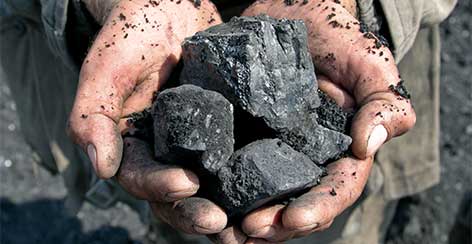A coal mine collapse in China was so bad it could force a rise in imports

A serious coal mine accident in China on the weekend will see the Asian powerhouse need to up its imports of coal to meet demand.
The fatal accident that reportedly claimed 21 lives has given rise to concerns that Chinese authorities will introduce stricter safety checks that could see more mines shut down.
Wood Mackenzie says it understands that all privately owned mines in Shenmu county were forced to suspend operations the day after the accident.
>> Scroll down for a list of ASX stocks with coking coal projects, courtesy of leading ASX data provider MakCorp
“We have also heard that mines in adjacent Fugu county — another large coal mining area — may also be subject to suspensions,” senior consultant Zhai Yu said.
Wood Mackenzie estimates that 50 million tonnes per annum (Mtpa) of production capacity will be impacted by operations halting at private mines in Shenmu.
“This could double to 100Mtpa if the mines in Fugu also face suspensions,” Mr Yu said. “We do not know how long the suspensions will last, but is likely to be for at least one month.”
More pain to come after Chinese New Year
Wood Mackenzie believes the reduced supply will have a bigger impact on the coal market after Chinese New Year, which is only three weeks away.
Private mines typically stop operating one week before the national holiday.
The Baiji Mining Company-owned mine had only just received its grade 2 safety rating — the second-highest standard in China’s mine safety rating system — in May last year.
Mr Yu said this suggested “flaws in the rating process”.
Authorities in Shaanxi province have now said they plan to introduce safety checks following the accident.
“We believe these new safety checks and the mine restart process after the holiday will be stricter than before — in Shaanxi province at least,” Mr Yu said.
“This will mean supply will be reduced as demand increases after the holiday for restocking.”
China needs more ‘fat’ coal
Mongolia-focused Aspire Mining (ASX:AKM) had an international coal market consultant compile a report on the metallurgical coal market and pricing expectations out to 2025.
Metallurgical coal is a low-ash, low-sulphur and low-phosphorus coal that can be used to produce high-grade coking coal — an essential part of the steelmaking process.
And the results are looking good for emerging coking coal producers.
According to Fenwei Energy Information Services, which did the “coal quality competitive assessment” of Aspire’s Ovoot coal project, there will be a significant shortfall of “fat” coking coal between now and 2025.
Fat coking coal is used in blends to produce coke for steelmaking in blast furnaces.
It creates conditions for good meltability, improving coke’s wear strength and creates conditions for adding other coals with low caking capability.
- Subscribe to our daily newsletter
- Bookmark this link for small cap news
- Join our small cap Facebook group
- Follow us on Facebook or Twitter
Fenwei forecasts a relatively balanced overall Chinese metallurgical coal market through to 2025 but with rising demand for quality fat coking coal.
“Due to the stricter requirements on coke quality in large blast furnaces and the increasing blending ratio of hard coking coal, fat coal market may see a large gap of 16-22Mt (per annum) in 2018-2025, which needs to be filled by imported coal, especially low and medium sulphur fat coal,” Fenwei explained in its report.
Aspire says Fenwei categorised the coal from its Ovoot project as “a moderate ash, moderate sulphur fat coking coal”.
“The targeted 3 to 4 million tonnes per annum of washed fat coal production from the Aspire OEDP [Ovoot early development plan] will go part of the way to meeting this deficit,” chairman David Paull said.
Mike Cooper, a senior editor covering the coal market for S&P Global Platts, told Stockhead that China’s recent mine disaster was expected to affect domestic coal supplies, ensuring Chinese customers take more from the seaborne market short-term.
China’s annual coal imports were up 3.9 per cent in 2018 and the government this month lifted a ban on imports at second tier ports, which is also likely to lead to a rise.
The Asian behemoth is particularly fond of Australian and Indonesian coal.
Although the price of coking coal exported from Australia has come off its March 2018 peak of $US202.35 ($281.22) per tonne, Mr Cooper said both thermal and coking coal prices in Australia have been “quite resilient for the past few months”.
Coking coal is trading at about $US173.25 per tonne.
The who’s who of coking coal
There are 20 small cap players that have coking coal mines. About half of those have operations either in Australia or Indonesia.
Here’s a list of small caps with coking coal projects, courtesy of leading ASX data provider MakCorp
Scroll or swipe for full table
| ASX Code | Company | Project Location | Price Jan 16 (intra-day) | Market Cap | One-year change |
|---|---|---|---|---|---|
| AJC | ACACIA COAL | QLD | 0.001 | $4.0m | -0.333333 |
| AHQ | ALLEGIANCE COAL | QLD, Canada | 0.051 | $25.0m | 0.225 |
| AKM | ASPIRE MINING | Mongolia | 0.02 | $66.5m | 0.666667 |
| BRL | BATHURST RESOURCES | New Zealand | 0.125 | $198.0m | -0.38 |
| B2Y | BOUNTY MINING (Listed 19/06/18) | QLD | 0.14 | $55.8m | -0.614 |
| BCB | BOWEN COKING COAL | QLD (Bowen Basin) | 0.023 | $12.3m | 0.1 |
| CKA | COKAL | Indonesia | 0.05 | $34.5m | -0.163636 |
| JAL | JAMESON RESOURCES | Canada | 0.17 | $44.8m | 0.133333 |
| LNY | LANEWAY RESOURCES | NSW | 0.0045 | $14.7m | 0 |
| MEY | MARENICA ENERGY | North America | 0.08 | $5.9m | -0.238095 |
| MCM | MC MINING | South Africa | 1.05 | $126.8m | 0.22449 |
| MRV | MORETON RESOURCES | QLD | 0.007 | $21.7m | -0.351852 |
| NAE | NEW AGE EXPLORATION | UK | 0.006 | $4.2m | -0.333333 |
| NCZ | NEW CENTURY RESOURCES | USA | 0.72 | $365.4m | -0.482143 |
| PAK | PACIFIC AMERICAN COAL | Canada | 0.049 | $5.8m | 0.129032 |
| PDZ | PRAIRIE MINING | Poland | 0.37 | $77.5m | -0.401639 |
| SMR | STANMORE COAL | QLD (Bowen Basin) | 0.955 | $241.4m | 0.397972 |
| TER | TERRACOM | QLD, Mongolia | 0.64 | $262.0m | 2.069768 |
| TIG | TIGERS REALM COAL | Russia | 0.04 | $71.7m | -0.298246 |
| WLC | WOLLONGONG COAL | NSW | 0.008 | $74.9m | -0.272727 |
Cokal (ASX:CKA), which is advancing its 60 per cent owned Bumi Barito Mineral (BBM) project in Indonesia towards production, has inked a deal to bring in Singapore-based Aahana Global Resources & Investment (AGRI) as a major shareholder.
The Sydney-based explorer said AGRI will acquire a 19.9 per cent stake that was previously owned by one of Platinum Partners’ funds that is now in liquidation.
In August last year, AGRI agreed to fully fund Cokal’s BBM project in exchange for a 40 per cent stake.
However, Cokal said late last year it was investigating “possible financial irregularities and fraudulent activity” that impacted its 2018 financial figures.
Companies with projects in Australia include Bowen Coking Coal (ASX:BCB), which is exploring ground in Queensland’s Bowen Basin.
The Bowen Basin, a 60,000 sq km area in central Queensland, hosts Australia’s biggest coal reserves and virtually all of the known mineable prime coking coal, according to the Bowen Basin Underground Geotechnical Society.
Junior Stanmore Coal (ASX:SMR) picked up Vale’s closed Isaac Plains mine in Queensland in 2015 for a measly $1.
This week Stanmore upped its production target for FY19 for the second time to 2.15Mtpa, with costs estimated at $86 a tonne (excluding state royalties).
The company, which right now is subject to a hostile takeover bid, said it was due to the Isaac Plains mine continuing to perform well above expectations.
Stanmore estimates it will book between $140 and $150m in earnings before interest, taxes, depreciation and amortisation in FY19.
Acacia Coal (ASX:AJC), Allegiance Coal (ASX:AHQ), Bounty Mining (ASX:B2Y), Moreton Resources (ASX:MRV) and TerraCom (ASX:TER) also have projects in Queensland.
Meanwhile, Laneway Resources (ASX:LNY), MC Mining (ASX:MCM) and Wollongong Coal (ASX:WLC) all have projects in New South Wales.
Stockhead is proud to use MakCorp as a provider of great value, accurate and reliable data on ASX-listed mining stocks. For more information head to MakCorp’s website.
 This article does not constitute financial product advice. You should consider obtaining independent advice before making any financial decisions.
This article does not constitute financial product advice. You should consider obtaining independent advice before making any financial decisions.
UNLOCK INSIGHTS
Discover the untold stories of emerging ASX stocks.
Daily news and expert analysis, it's free to subscribe.
By proceeding, you confirm you understand that we handle personal information in accordance with our Privacy Policy.








